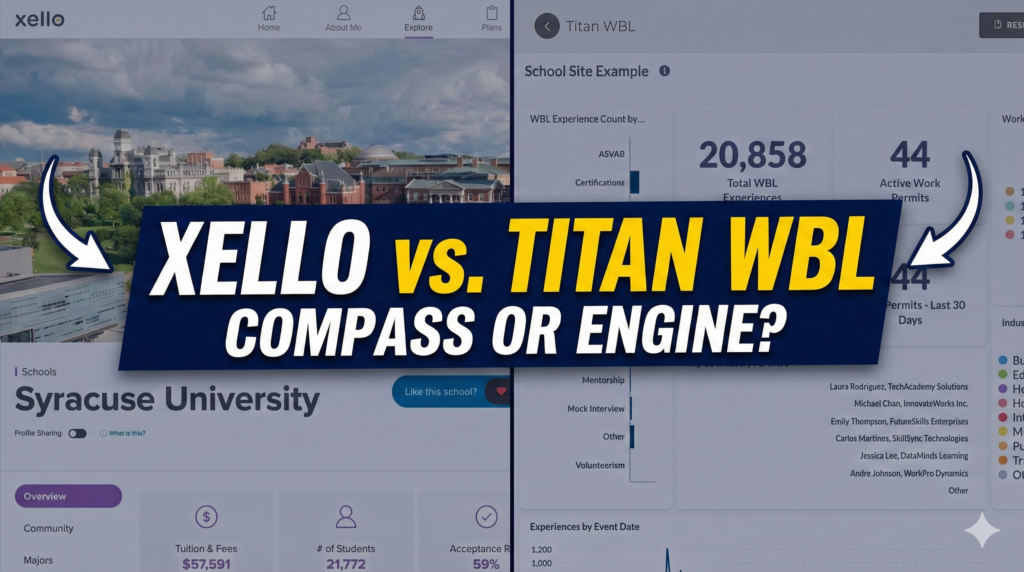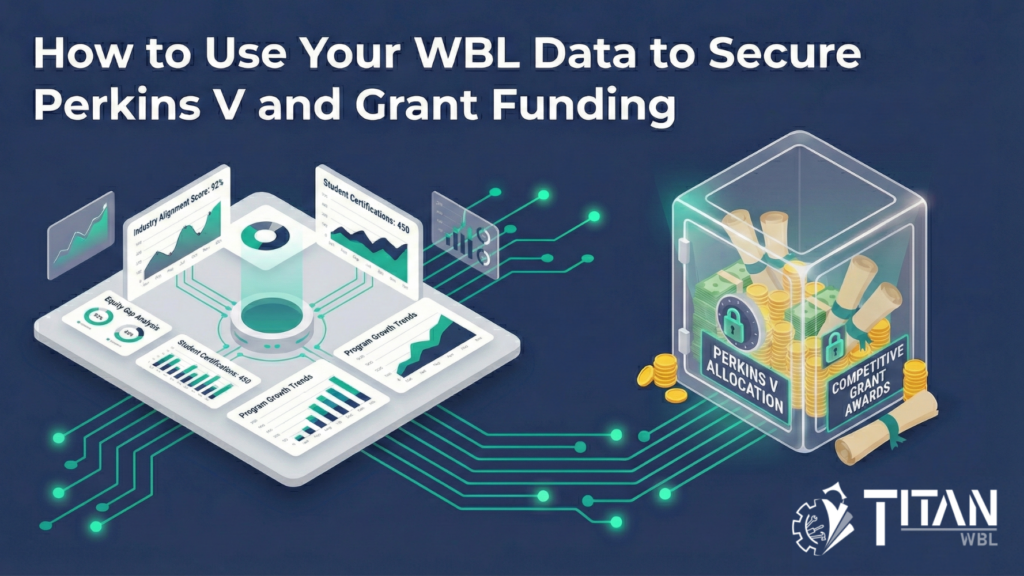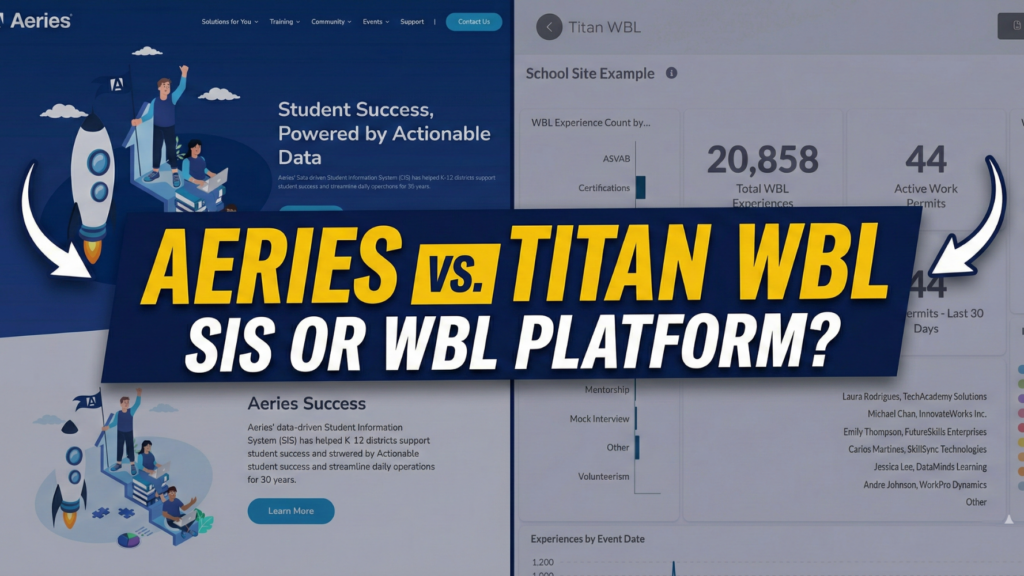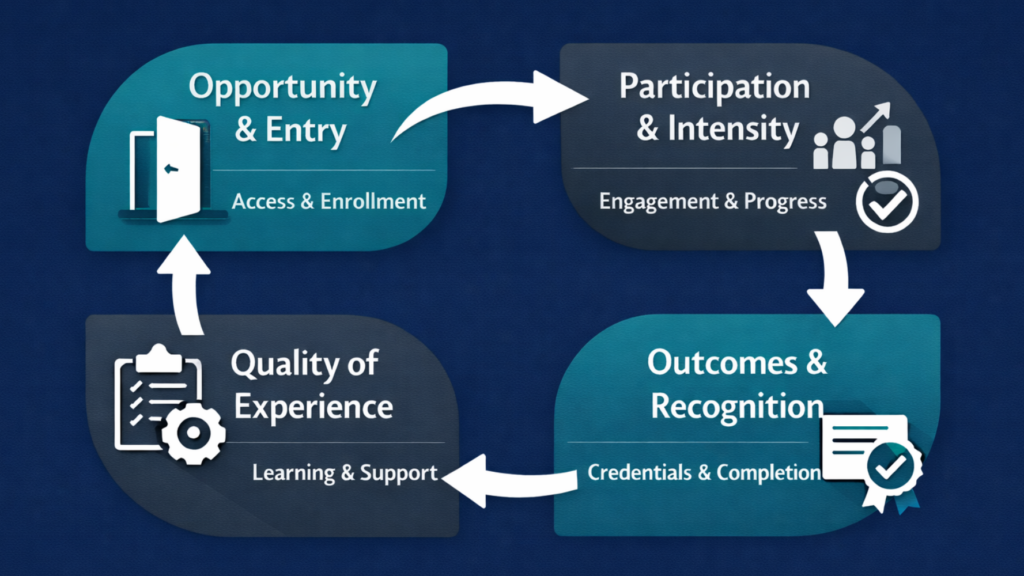Introduction
Every district knows that Work-Based Learning compliance is essential to Career and Technical Education (CTE) success. Yet few leaders realize how much time, money, and energy are lost every year trying to meet compliance reporting requirements. Across the country, coordinators spend weeks tracking data in spreadsheets, chasing teachers for updates, and reformatting reports before state deadlines.
What should be a simple and standardized process often turns into a cycle of stress, errors, and lost productivity. The truth is, compliance reporting has become one of the most underestimated risks in education, and it is costing districts more than they think.
In this article, we will explore why Work-Based Learning compliance is so difficult to manage, the real risks of getting it wrong, and how modern tools like TitanWBL help districts eliminate chaos while protecting funding and improving equity.
Why Work-Based Learning Compliance Is So Difficult
Work-Based Learning compliance requirements are designed to ensure accountability and equity in CTE programs. But in reality, they often overwhelm districts with manual work and fragmented data systems.
1. Too Many Systems, Too Little Integration
Most districts use a mix of Google Sheets, Excel files, and paper forms to track student experiences. These systems do not communicate with one another, forcing staff to manually combine data from multiple sources.
2. Manual Data Entry and Version Confusion
When compliance depends on spreadsheets, errors are inevitable. One wrong formula or missing cell can throw off an entire report. Worse, multiple staff members often edit different versions of the same file, leading to confusion and wasted hours.
3. The Deadline Crunch
In the weeks before compliance submissions, coordinators scramble to locate missing information. Teachers and counselors are flooded with emails asking for updates, while administrators work overtime to reconcile data.
4. Compliance Fatigue
Even dedicated staff reach a breaking point. The stress of meeting recurring deadlines leads to burnout and turnover, especially among Work-Based Learning coordinators who handle massive workloads with minimal tools.
The Hidden Cost of Compliance Errors
Poor Work-Based Learning compliance does not just cause frustration. It threatens district stability and long-term success.
Funding Delays and Financial Penalties
Inaccurate or late submissions can lead to delayed reimbursements or even loss of CTE funding. Every mistake adds to the financial strain on district budgets.
Audit Risks and Reputational Damage
Compliance issues attract audits. Districts that cannot produce clean, validated data risk losing credibility with state agencies and community partners.
Missed Opportunities for Students
When compliance data is incomplete or unreliable, equity suffers. Without accurate tracking, districts cannot identify which student populations are underrepresented in Work-Based Learning programs.
Staff Burnout and Turnover
The constant pressure to get compliance right without proper systems leads to burnout. Every year, talented coordinators leave roles because of overwhelming manual work.
What Failing Work-Based Learning Compliance Looks Like
If your district faces any of the following, your compliance process is already at risk:
- Data scattered across multiple files or schools
- Reports that take more than a week to prepare
- Frequent last-minute corrections before deadlines
- Unclear version control or duplicated entries
- Difficulty verifying participation or partner data
- No audit trail for who entered information
These are all warning signs that your district’s Work-Based Learning compliance process has outgrown manual tools.
The TitanWBL Solution: Simplifying Work-Based Learning Compliance
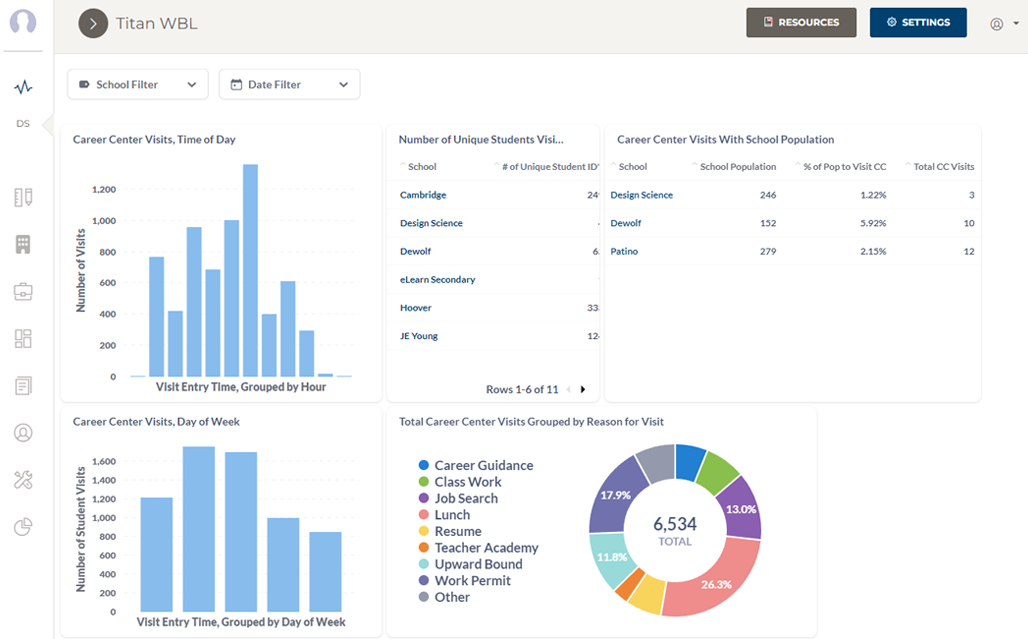
TitanWBL was designed to help districts meet every compliance requirement without stress, errors, or inefficiency. Built specifically for K–12 Work-Based Learning, it automates data collection, ensures accuracy, and simplifies reporting.
Centralized Data Management
TitanWBL connects students, teachers, coordinators, and industry partners in one secure platform. Data from multiple schools syncs automatically, eliminating duplicate entry and missing records.
Automated Compliance Reports
Instead of manually formatting spreadsheets, TitanWBL generates ready-to-submit compliance dashboards aligned with state and federal reporting standards.
Built-In Error Validation
The system automatically checks for missing fields, duplicate entries, and mismatched data. Districts can fix issues before submission rather than after an audit.
FERPA-Compliant Security
TitanWBL protects sensitive student data with role-based access and secure storage. Districts can confidently demonstrate compliance with privacy requirements.
Real-Time Equity Tracking
Dashboards visualize participation by demographic group, helping administrators ensure equitable access to Work-Based Learning opportunities for all students.
Time and Cost Savings
Districts report saving hundreds of staff hours each year while improving data accuracy and audit readiness. Compliance becomes a simple, predictable process instead of a last-minute scramble.
Real-World Example: From Chaos to Clarity
One large California district faced annual compliance chaos with multiple spreadsheets, missing partner data, and constant correction requests from the state. After adopting TitanWBL, they consolidated every CTE and Work-Based Learning record into a single system.
Within three months:
- Compliance reports were submitted two weeks early.
- Staff time spent on data cleanup dropped by 80 percent.
- Audit requests were resolved in minutes instead of days.
- Students benefited from expanded Work-Based Learning access because coordinators could focus on partnerships instead of paperwork.
This district transformed compliance from a liability into a strategic advantage.
Why Work-Based Learning Compliance Needs Modern Tools
Compliance in education will only become more complex. States are introducing stricter data collection standards for participation, employer engagement, and equity. Districts that rely on spreadsheets are being left behind.
Modern Work-Based Learning compliance solutions like TitanWBL give districts three things manual systems never can:
- Accuracy through automated validation and error detection.
- Accountability with audit-ready dashboards and permissions.
- Efficiency that saves time and allows staff to focus on students.
Compliance should empower districts, not exhaust them.
FAQs: Work-Based Learning Compliance

1. What is Work-Based Learning compliance?
It refers to the process of tracking, validating, and reporting student participation and outcomes in Work-Based Learning programs, as required by state and federal agencies.
2. Why do so many districts struggle with compliance?
Because most rely on manual data systems like spreadsheets that are error-prone, time-consuming, and not built for K–12 complexity.
3. How does TitanWBL help?
TitanWBL automates compliance reporting, integrates student and partner data, and generates ready-to-submit dashboards that eliminate manual work and reduce risk.
4. Is TitanWBL compliant with FERPA?
Yes. TitanWBL follows FERPA data privacy standards with secure cloud storage and role-based access controls.
Conclusion
Compliance reporting does not have to be chaotic. With Work-Based Learning compliance tools like TitanWBL, districts can move from reactive data management to proactive accountability. By eliminating manual entry, reducing errors, and simplifying submissions, TitanWBL helps schools protect funding, ensure equity, and refocus on what matters most — preparing students for their future.
References and Further Reading
- U.S. Department of Education Work-Based Learning Toolkit
- Jobs for the Future Work-Based Learning Framework
- Advance CTE: State Strategies for Scaling Work-Based Learning
- Spreadsheet Risk Management in Organizations (Research Paper)
- The Data Trap: 5 Surprising Truths Every Higher Ed Leader Needs to Know



